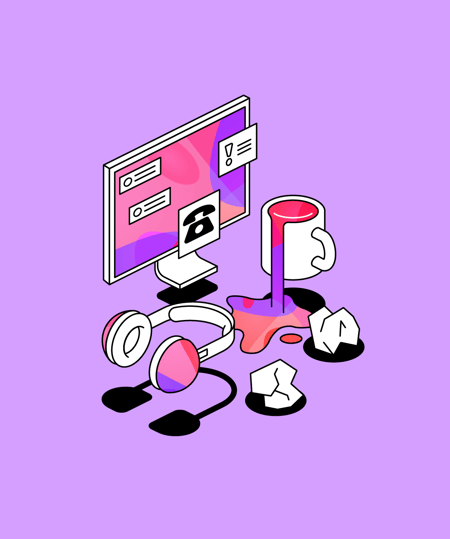How to support students to prepare and deliver presentations
Presentations remain a source of anxiety for many students. What can be done to support and empower students to feel more prepared? Here, we take a look at some of the strategies that can be implemented to ensure all students feel able to participate in presentations confidently.
 2 min read
2 min read
 Published: 6 Nov 2025
Published: 6 Nov 2025
 Phoebe Hoar
Phoebe Hoar


Academic presentations are a cornerstone of assessment across higher education. They play a crucial role, not only for evaluating course knowledge but also for equipping students with vital communication skills that will benefit them long after graduation.
Yet, for many students, the thought of presentations come with high anxiety. This anxiety doesn't just impact their grade; it actively hinders their ability to communicate effectively, retain information, and perform confidently under pressure, all of which are essential skills both in education and beyond.
If anxiety prevents students from truly engaging with the task, or even causes them to avoid it altogether and seek alternative assessment, they are not only held back academically but also prevented from developing these lifelong skills.
The issues with existing presentation support strategies
Higher education professionals understand the importance of communication skills, but are often caught between policy and practicality.
When it comes to supporting learners to deliver presentations, this tends to manifest itself in the following ways:
- The burden of the alternative: Professionals are often forced to approve alternative assessments because there's a lack of genuinely accessible options for oral presentations. This removes the assessment and anxiety, but not the skills gap.
- A growing concern for mental health: Increasing student anxiety and mental health concerns demand solutions, but there are few scalable tools available to address these needs effectively.
- Time intensive coaching: The limited time and resources are currently focused on intensive 1:1 coaching and support which is difficult to scale across campus.
The question is: How do you support the growing need for inclusive student presentation preparation and delivery, without overwhelming your team or sacrificing the skill-building opportunity?
How to make presentation support more inclusive
Using presentations as a form of assessment is an essential part of the curriculum. Therefore, the anxiety it causes students will always be a problem unless we change the way students prepare.
The current methods, such as a reliance on 1:1 coaching or alternative assessments, are simply not scalable solutions for a campus wide dilemma.
Research shows that empowering students through structured practice and feedback is the key to managing anxiety and building confidence for presentation delivery.
We need to focus on providing tools and methods for student presentation preparation that are low stakes and inclusive before the assessment, such as:
- Low stakes rehearsal opportunities. These formative assessments allow students to practice, experiment, and receive feedback in a way that builds confidence and improves skill acquisition. This may look like peer to peer presentations or regular communication practice opportunities.
- Providing communication guidelines and expectations. Allowing students to be clear on how and why they’re being assessed allows them to prepare appropriately. Furthermore, setting explicit guidelines and opportunities for questions to be raised can help relieve some of the anxiety faced by neurodiverse learners.
- Digital platforms that offer guided, targeted feedback, relieving the burden of constant 1:1 support. The use of video recordings and digital tools facilitates effective peer feedback that can be annotated to specific moments in the presentation.
- Self paced preparation that respects the needs of diverse learners, as inclusive practice means avoiding criteria (e.g. eye contact) that may unfairly disadvantage neurodivergent students.
By implementing scalable tools for effective student presentation preparation, you eliminate the barriers that lead to anxiety, making the final presentation an accessible expression of learning.
The ultimate goal of an inclusive campus is to ensure that every student can fully participate in their education, including high value assessments like presentations.
The challenge is not the students; it's the lack of scalable, evidence based preparation tools to support them. Student support services deserve a solution that helps to provide true inclusion without increasing the already significant workload.
More from Supporting Students
View All
 2 min read
2 min read
How AI note taking tools can bridge learning gaps for STEM students with disabilities
Here, we explore how AI powered note taking tools act as a critical scaffold for STEM students with disabilities, helping with active conceptual engagement. This post breaks down how live transcripts and AI-generated retrieval practice. like quizzes, empower students to navigate technical subjects with full academic independence.

 3 min read
3 min read
How Genio Present can help students become more confident speakers
Students with anxiety or Specific Learning Differences can struggle to participate in oral assessments confidently and equitably. Learn how Genio Present helps students overcome public speaking anxiety, transforming nervousness into confidence and improving academic performance through innovative rehearsal techniques based on learning science.

 5 min read
5 min read
6 accessible learning apps for college students in 2026
Selecting tools that bridge accessibility and independence can be a transformative step in a student’s academic journey, fostering skills that last long after graduation. Here, we explore 2026’s top accessible learning apps, which empower students by automating unproductive barriers while preserving the deep, active engagement essential for true learning.





